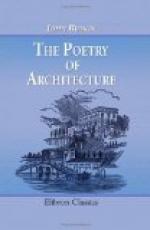IV.
THE MOUNTAIN COTTAGE—WESTMORELAND.
47. When I devoted so much time to the consideration of the peculiarities of the Swiss cottage, I did not previously endeavor to ascertain what the mind, influenced by the feelings excited by the nature of its situation, would be induced to expect, or disposed to admire. I thus deviated from the general rule which I hope to be able to follow out; but I did so only because the subject for consideration was incapable of fulfilling the expectation when excited, or corresponding with the conception when formed. But now, in order to appreciate the beauty of the Westmoreland cottage, it will be necessary to fix upon a standard of excellence, with which it may be compared.
One of the principal charms of mountain scenery is its solitude. Now, just as silence is never perfect or deep without motion, solitude is never perfect without some vestige of life. Even desolation is not felt to be utter, unless in some slight degree interrupted: unless the cricket is chirping on the lonely hearth, or the vulture soaring over the field of corpses, or the one mourner lamenting over the red ruins of the devastated village, that devastation is not felt to be complete. The anathema of the prophet does not wholly leave the curse of loneliness upon the mighty city, until he tells us that “the satyr shall dance there.” And, if desolation, which is the destruction of life, cannot leave its impression perfect without some interruption, much less can solitude, which is only the absence of life, be felt without some contrast. Accordingly, it is, perhaps, never so perfect as when a populous and highly cultivated plain, immediately beneath, is visible through the rugged ravines, or over the cloudy summits of some tall, vast, and voiceless mountain.




